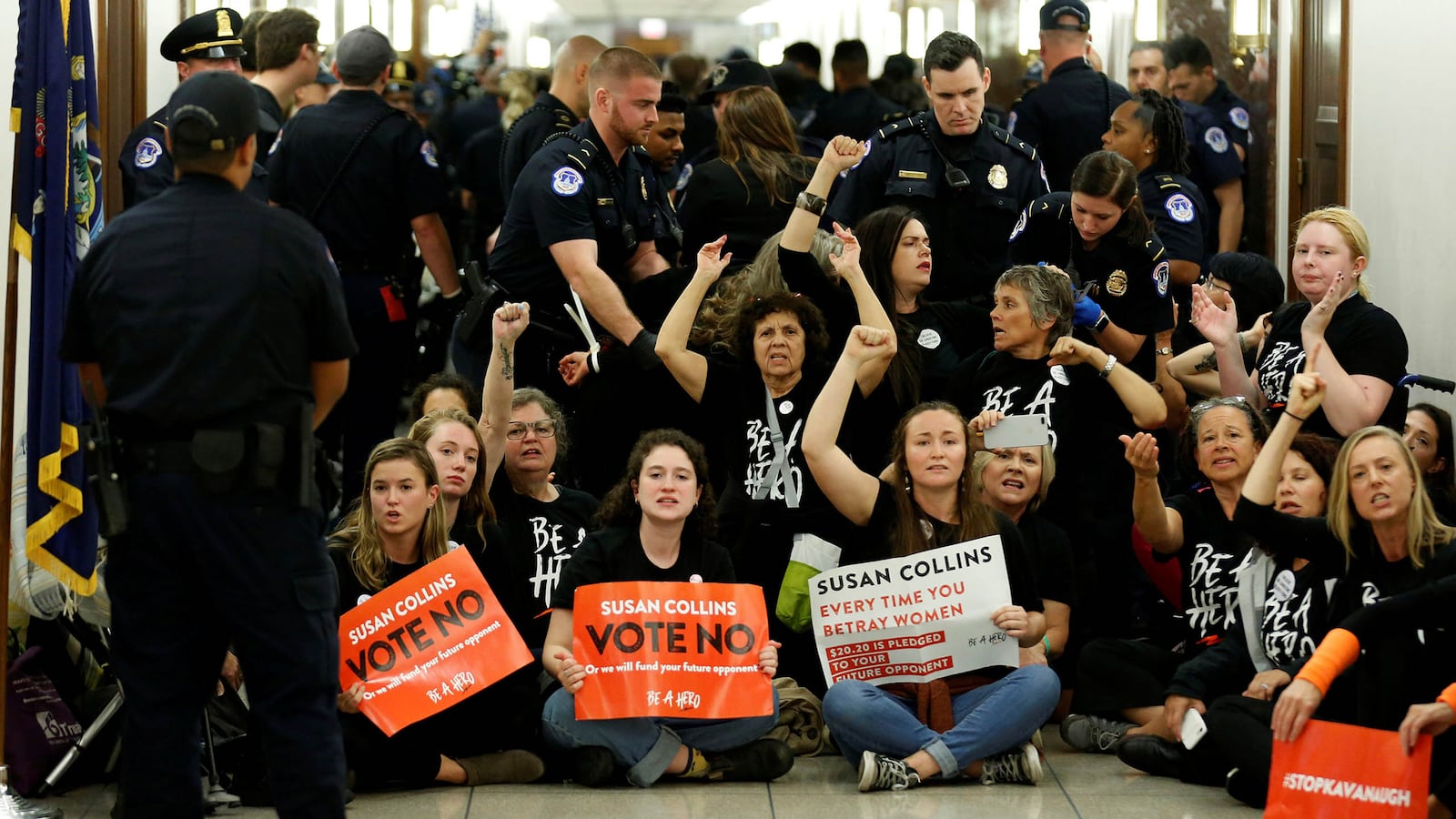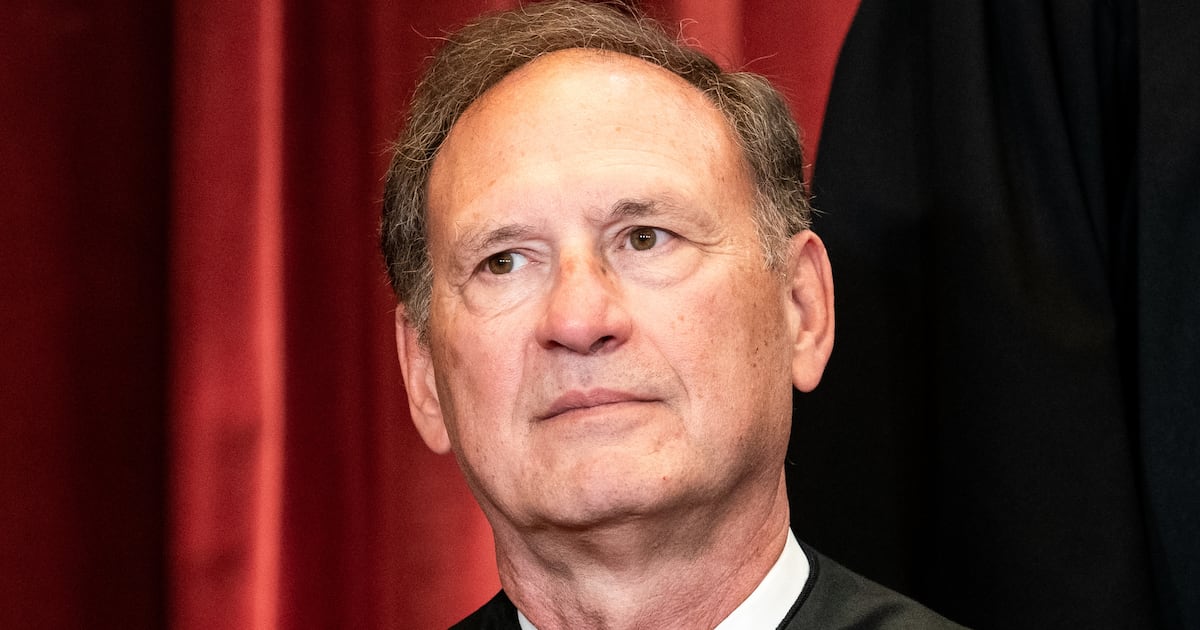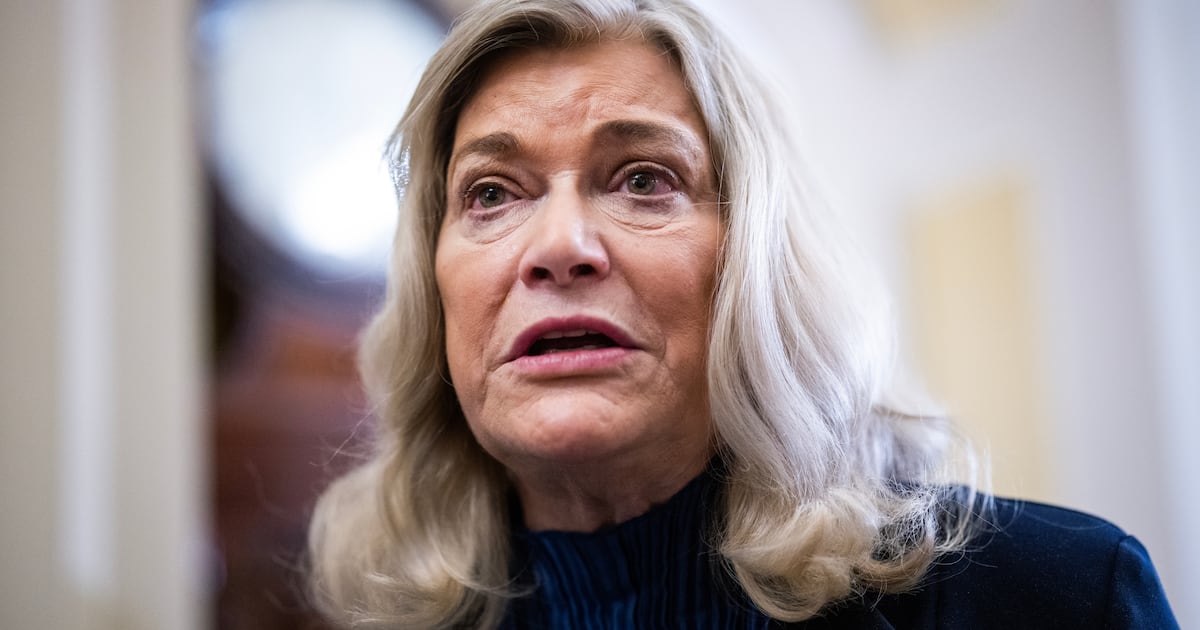On a rainy day in mid-September, a small group of students from Bates College and a Democratic candidate for Senate descended upon Sen. Susan Collins’ Lewiston office and pretended to die.
Protest die, that is.
Some held “Stop Kavanaugh” signs with bandages around their heads, others had arms in slings. One young woman had fake blood plastered down the inside of her legs with a wire hanger hanging from her black shorts.
“As we go in, we are going to fake die,” one student said, telling fellow protesters to position the signs they were carrying over their bodies. The student instructed the others to say “whatever we think will move Susan Collins but also having the image be a big part of moving her in itself.”
Collins was not moved.
The Maine senator cast her vote in favor of Brett Kavanaugh’s confirmation on Sunday but not before taking the opportunity on Friday to give a speech on the Senate floor in which she took a swipe at those who—she said—tried to bully her into voting no.
Among those who made such an attempt were the students captured in a video posted on Democratic Senate candidate Zak Ringelstein’s Facebook page in mid-September. But there were plenty others too. Over the past few weeks, protesters, sexual assault survivors, Democratic activists and individuals staging “die-ins” have all gone to Collins’ offices in D.C. and Maine and even to her home in hopes of swaying her vote on Kavanaugh. What they discovered is that the senator will listen to constituents and hear opposing viewpoints. But, when push comes to shove, she simply doesn’t respond to pressure campaigns.
“Senator Collins met with hundreds of Mainers on both sides of this debate, both in her Washington office, at her offices in Maine, and via video conference,” Annie Clark, a spokeswoman for Collins, told The Daily Beast. "But as a rule, she never meets with protesters at her home. To do otherwise would be a security risk we are unwilling to take.”
“The most compelling advocacy is advocacy that’s sincere, that’s personal, and that’s done in a thoughtful and respectful way,” Clark said. “Those are the voices that Senator Collins tends to listen to most closely.”
For the past two decades this has been the hard and fast rule for those trying to lobby Collins. Each time there is a contentious debate in the Senate where her vote could be up for grabs, interest groups and protesters swarm the Maine senator under the belief that their act of persuasion could sway her vote.
What they forget, according to a former Collins staffer who now advises various groups on how to communicate with the senator, is that she is, in fact, a Republican.
“They beguile themselves into thinking that a moderate means that’s a Republican that will always vote with them,” said the staffer, who asked to remain anonymous in order to speak freely.
“She’s a serious person, you have a way to go in and communicate with her,” the staffer added. “[C]ommunicating with her by protesting and shouting and bullhorns and harassing and showing up and having die-ins on her lawn in Bangor Maine… may make great optics, it may help with fundraising, it may make you feel good but it is totally and absolutely opposed to the true goal to get her to vote a certain way on something.”
The debate over the Kavanaugh nomination was particularly pointed in its anger, emotion and, at times, vitriol. Along with the sexual assault survivors who came to D.C. to plead with senators to vote against Kavanaugh and groups of peaceful protesters who spent days on the Capitol complex, there were also rape and death threats made to senators, their staff and their families. Security on Capitol Hill tightened and Collins as well as several other senators were assigned a police detail in order to further ensure their safety.
In an interview with 60 Minutes after her vote, Collins called it “difficult” and “as ugly a situation” she has seen in her 22 years in the Senate. “I have had to have security because of threats against me and family members and staffers and this has been unlike anything I have ever been through,” she said.
For those who have watched Collins through the years, it was precisely the wrong approach. It’s well known within Senate Republican leadership to give Collins the space she needs to make a decision. Because anything short of that could backfire.
“There is perhaps no U.S. senator who is less responsive to intimidation than Susan Collins,” Josh Holmes, a former top McConnell aide, said. “Every single time one side or the other attempts to push her around it makes her more focused on the facts and less interested in the politics.”
But for others, including outside groups, the notion that Collins was even persuadable on Kavanaugh in the first place has come to seem particularly far-fetched. After all, Collins has never voted against a Supreme Court nominee—no matter who was in the White House.
At various junctures, she seemed to go out of her way to defend Kavanaugh, even insisting that he had confirmed he would uphold protections for abortion rights when he had simply stressed that those rights were a judicial precedent. Planned Parenthood, which had given an award to Collins less than a year prior, did run anti-Kavanaugh ads in Maine, warning about the threats he posed to abortion rights. But the spots were notably gentle in their attempts to get the senator to vote no and didn’t include any overt electoral threats.
Jim Manley, a former Democratic leadership staffer said that Collins often is among the more difficult senators to persuade, precisely because she votes Republican while maintaining the veneer of a sensible centrist. That was true with respect to Kavanaugh. And it’s been true at other times too.
During the 2009 stimulus vote, Manley recalled, Collins spent a lot of time with then-Majority Leader Harry Reid (D-NV) negotiating in his office.
“As far as [Sen. Harry] Reid was concerned, if you want to try to get Collins’ vote, you had to spend a lot of time to convince her to get to your point of view,” Manley said. Even after she demanded that Democrats ultimately reduce the amount of the stimulus, Reid never tried to exert negative pressure on her. “She was too quirky for that to work,” Manley said.
Eventually, Collins chose to support the measure, just one of three Republicans to do so.
In other major legislative debates, those trying to win Collins’ vote haven’t shown the adequate finesse. During talks over tax reform, environmentalists walked into her office dressed as reindeer in an attempt to convince her that the Alaska National Wildlife Reserve should not be opened up for drilling, as it was under the bill.
“It just annoyed her,” the first former staffer said. “She has thick skin. She doesn’t mind being annoyed.”
When the Senate was trying to repeal Obamacare and replace it with the “skinny” version, a different left center group chose to approach her as a potential ally. Instead of public protests or massive social media campaigns, they presented how Maine would be impacted by the proposed legislation. Collins ended up being one of three Republican holdouts on the bill, effectively killing it.
“They went at her as if she were a lawmaker that wanted to get herself where she could stand solidly on data and say, ‘I’m making this decision because I’ve been provided information by these people,’” the former staffer said.
Collins came to her vote on Kavanaugh in similar fashion, those who know her say. And, as has been the case in previous high-profile debates, the political fallout has been the same. The senator is, once again, under immense criticism from one side of the ideological ledger, with heightened talk of her being unseated in the next election.
“We always heard the same patterns, which is ‘oh this will be the end’, she’s going to get beat in the next election,” a second former staff said.
Already, two political action committees based in Collins’ home state, the Maine People’s Alliance and Mainers for Accountable Leadership, have joined forces to create a fund for whoever decides to challenge Collins in 2020. It was initially started before the Kavanaugh vote as an incentive for Collins to vote against the nomination. Since the vote, donations to the fund have exploded, now totalling more than $3.6 million.
It’s a tactic that Collins has called “bribery” and the type of bullying that aides say will only make her position harden. And yet, this time, even those groups that seemed to understand that it was better to approach the senator with a softer touch appear out for vengeance. After Collins voted for Kavanaugh, Planned Parenthood’s political arm tweeted that “she can no longer call herself a women’s rights champion.”
“Women,” the group added, “won’t forget.






